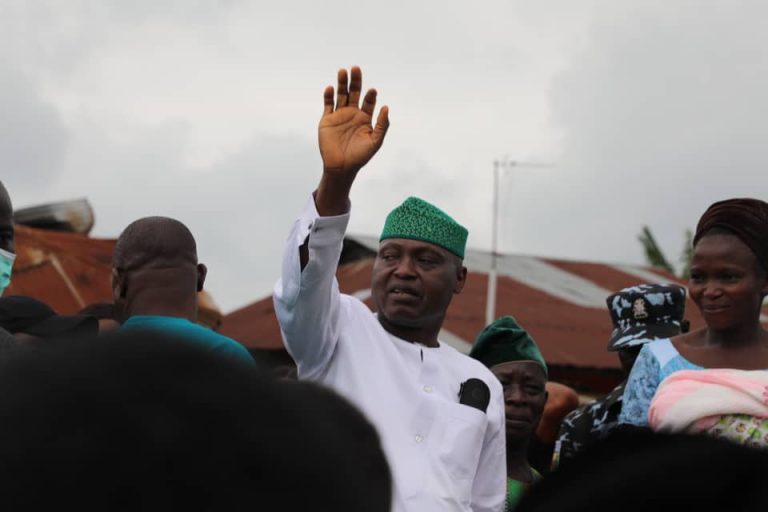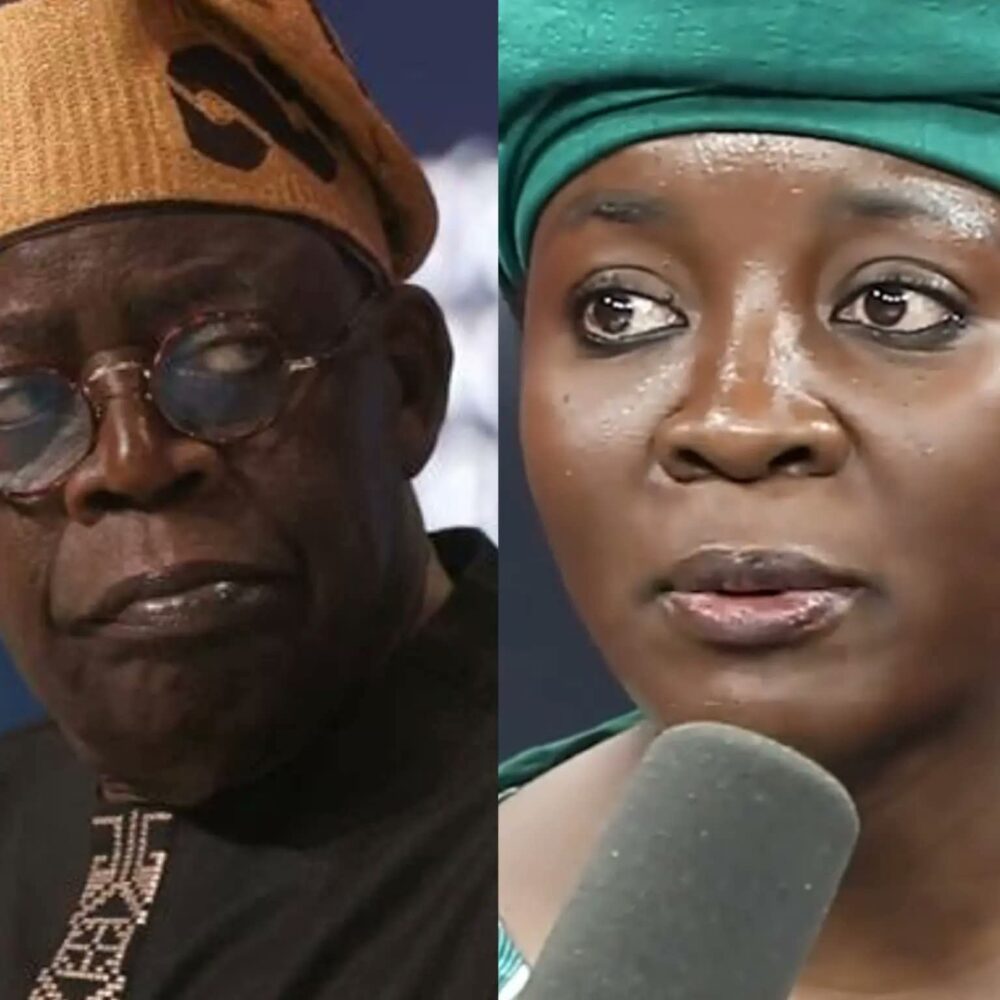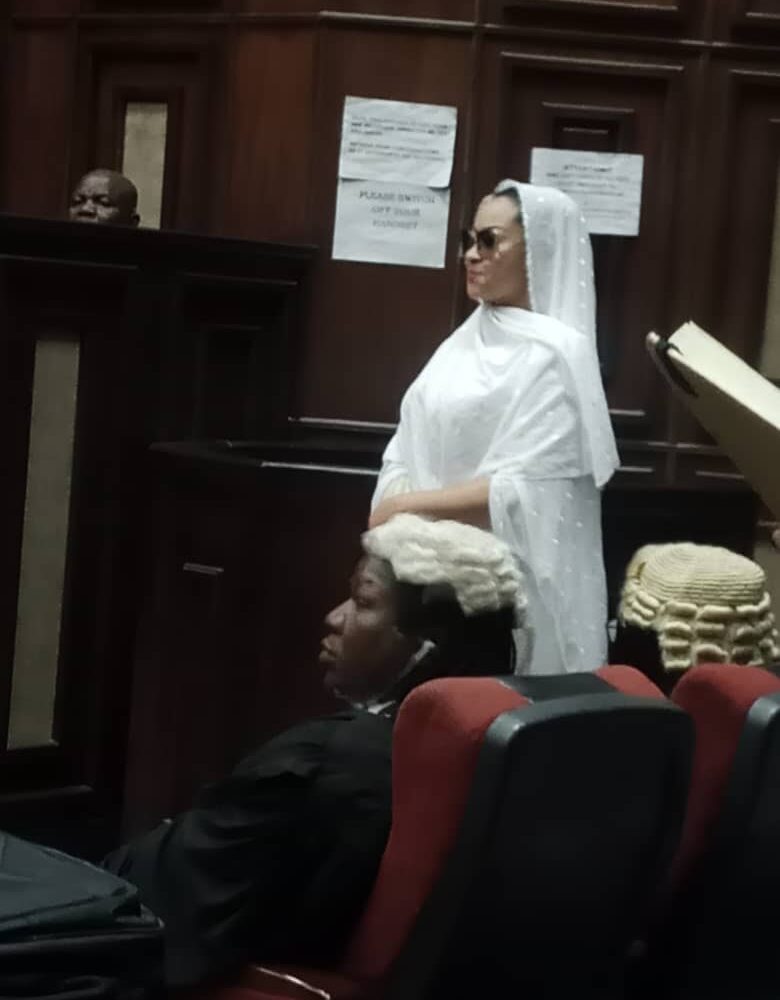Some fail to bear in mind that everyone is sentenced to death. Death is a treacherous virus that strikes randomly. The only truth is that nobody is going to make it out alive. We are all living on probation and our expiry date is indefinite – Erik Pevernagie
Africans in their wisdom say; the falling of dry leaves on top of a tree, a warning to other leaves on the tree. So be careful, and never celebrate other people’s downfall. No man should rejoice at the death of another because each man is involved in mankind; every man is a piece of the continent, a part of the main and for that fact what goes around surely comes around.
When the bell tolls for another, be sure that it’s just a matter of time before the tide turns and the turn might just be yours. Therefore, there shouldn’t be much fussing about a fallen man. At appointed time, every man must fall willy-nilly. If what we hear is to be believed, the tide has turned for Abba Kyari, former Chief of Staff to President Muhammadu Buhari.
Rumours have it that he succumbed to the cold hands of death late in the night of Friday, April 17, 2020, losing the survival battle to the dreaded COVID-19 disease at First Cardiology Consultants Hospital, Lagos, aged 82 years and five months old. The next day, Kyari’s funeral was televised as he was interred at Muslim Section of Gudu cemetery in Abuja.
From the feelers, mixed reactions greeted the news of his death. Some are sorrowful, some are very happy while there are few skeptics who do not believe the veracity of the news. Whatever the case, the pertinent question really is, why such mixed reactions?
It is a known fact that Africans honour the memory of the dead and very often don’t speak ill of the dead. But history has shown that there are few exceptions. Generally, the exits of dictators which Africa possesses in abundance are often celebrated not mourned. Is Kyari a dictator?
Well, Alhaji Abba Kyari OON was born on Thursday, November 17, 1938. He was a Kanuri from Borno State whose early beginning is shrouded in utmost secrecy. Despite rising to position of prominence later in life, not much is known about his early life. Nevertheless, he excelled academically and was about 42 years old when he began to gain public recognition.
Precisely in 1980, he graduated with a bachelor’s degree in Sociology from the University of Warwick, and also received a bachelor’s degree in law from the University of Cambridge. Then, he was called to the Nigerian Bar in 1983 after attending the Nigerian Law School. The following year, he obtained a master’s degree in law from the University of Cambridge.
That was good but not good enough for the ambitious Kyari who refused to rest on his oars. He vigorously pursued his intellectual career as he later attended the International Institute for Management Development in Lausanne, Switzerland and participated in the programme for Management Development at the Harvard Business School, in 1992 and 1994, respectively.
Upon his return to Nigeria, Kyari worked for the law firm Fani-Kayode and Sowemimo for a while before testing his hands on journalism and later politics. From 1988 to 1990, he was Editor with the New Africa Holdings Limited Kaduna. In 1990, he served as a Commissioner for Forestry and Animal Resources in Borno State and soon after veered into commerce.
From 1990 to 1995, Kyari was the Secretary to the board of African International Bank Limited, a subsidiary of Bank of Credit and Commerce International. He was an Executive Director in charge of Management Services at the United Bank for Africa, and later was appointed the Chief Executive Officer. Again, he excelled and then set his eyes on greater things.
In 2002, he was appointed a Board Director of Unilever Nigeria, and later served on the board of Exxon Mobil Nigeria. Kyari’s marriage to the sister-in-law of the Nigerian renowned Sociologist, writer and politician, Ibrahim Tahir, was blessed with four children. It would appear that Tahir who was a prominent member of the Kaduna Mafia paved way for his in-law.
When Muhammadu Buhari became President after the 2015 election, Abba Kyari was appointed on Thursday, August 27, 2015 as Chief of Staff to the President. The Chief of Staff to the President is the senior operational member of the Office of the President of Nigeria established by Olusegun Obasanjo on May 29, 1999 when he appointed Abdullahi Mohammed to the office.
Of course, the President does not require endorsement from the Senate to appoint a Chief of Staff since it’s deemed his private affair. However, the office is strategic to the success or failure of any administration as a result of vital responsibilities reposed on it. These responsibilities include, but not limited to; selecting key presidential staff and supervising them.
Also structuring the staff system, controlling the flow of people to Aso Villa, managing the flow of information, protecting the interests of the president, negotiating with the National Assembly and other branches of government to implement the president’s agenda; and advising the president on various issues, including telling the president what they do not want to hear.
Doubtless, the function of Chief of Staff varies from administration to administration; and depends not only on the qualities of the person appointed to the position, but also on the style and management philosophy of the incumbent President. Primarily, the Chief of Staff is the principal channel of communication between the President and the government.
From Saturday, May 29, 1999 to Friday, April 17, 2020, five Chiefs of Staff have served four Nigerian Presidents. Abdullahi Mohammed who served President Obasanjo and partly under President Yar’Adua from May 29, 1999 – June 2, 2008, and Gbolade Osinowo who served briefly under Yar’Adua from June 2, 2008 – September 18, 2008 before the office was abolished.
When Goodluck Jonathan became President at the wake of Yar’Adua’s demise on Wednesday, May 5, 2010, the office of Chief of Staff to the President resurfaced with the appointment of Mike Oghiadomhe as Chief of Staff from May 17, 2010 – February 10, 2014, and became vacant briefly until the appointment of Jones Arogbofa from February 18, 2014 – May 29, 2015.
Ultimately, the mercurial Abba Kyari stepped in under President Buhari and served from August 27, 2015 to his death on April 17, 2020. Even though the position of Chief of Staff wields considerable influence as a result of the crucial roles they perform, none but Kyari made it most prominent and most powerful as such, he was the better known of them all; why was it so?
In reality, few Presidents in history ever ruled on their own terms, often than not, they are controlled by power behind the throne. This refers to a person or group that informally exercises the real power of an office. In politics, it most commonly refers to a spouse, aide, or advisor of a political leader who serves as de facto leader, setting policy through influence or manipulation.
During President Buhari’s first term, Kyari worked mainly behind the scenes to implement the president’s agenda until the unexpected turn of events. What event? Recall that from Sunday, May 7 to Saturday, August 19, 2017, Buhari spent unprecedented 103 days outside Nigeria in London hospital as a result of undisclosed ill-health. Naturally, nature abhors vacuum.
So, in the absence of the President, Kyari became the main man behind the throne. As if luck was on his side, after Buhari’s re-election for a second term in 2019, the president ordered his cabinet to channel all requests through Kyari’s office, this, further enhanced Kyari’s influence within the government circles, and made him being labeled as the de facto head of government.
But it also raised question as to whether Buhari was alive or being impersonated by a body double Jubril Al-Sudani as consistently being alleged by the leader of the Indigenous People of Biafra (IPOB), Mazi Nnamdi Kanu. The increasing absence of Buhari on the public domain and Kyari’s visibility and clashes with key government officials only made the assumption worse.
For instance, on Wednesday, November 1, 2017, following a leaked memo on the plan to return the former Pension Boss, Abdulrasheed Maina, Kyari became embroiled in a public argument with the Head of Civil Service, Winifred Ekanem Oyo-Ita, who was later removed from the office and arrested. In 2020, in another leaked memo, Babagana Monguno the National Security Adviser accused Kyari of meddling in matters of national security, but later amicably settled.
Because of untold hardship that came upon Nigerians necessitated by unprecedented corruption, tribalism, bigotry, and nepotism, under Kyari’s watch, naturally, he became a term of public opprobrium as many believed he pulled the strings under Buhari’s regime. March 2020 however marked the beginning of an end to an influential figure within the Buhari administration.
Precisely, on Tuesday, March 24, 2020, it was made public by the Presidency that Kyari tested positive for COVID-19 on the previous day, following an official trip to Germany nine days before. He would later die from complications related to COVID-19 barely three weeks after.
The questions are: Did Kyari live a fulfilled life? Did he have the opportunity to effect a positive and lasting change in Nigeria’s political landscape? Did he leave Nigeria better or worse than he met it? It is left for each man to answer but beyond the rhetoric, how about us, and what are we doing currently? Should the bell toll for any of us today, what legacies are we leaving behind?
If we go biblical, maybe we can then say that Kyari was fortunate for “Our days may come to seventy years, or eighty, if our strength endures; yet the best of them are but trouble and sorrow, for they quickly pass, and we fly away,” (Psalm 90:10). Bear in mind that in 2020, the life expectancy for Nigeria is 54.81 years in contrast to Hong Kong’s 81.8 rated highest in the world.
Truth be told, no man is perfect and Kyari may have made his mistakes. Yet, his journey to the top rung of leadership establishes only one thing, namely, it’s the tortoise’s shell, ugly and hard, that protects its life-long journey on earth. He faced multiple challenges no doubt; some he inherited some he created but ultimately, his chapter is closed.
The Achilles heel of Buhari’s administration where he played vital role is lack of openness to the public. That created suspicions and rumours and put many people off who would have ordinarily supported his course. He may have good intentions but how would the people know since there’s no art to find the mind’s construction as Shakespeare says.
Whatever lessons are there is for the living. Leadership is about service, it is about sacrifices for the good of those being led. But when leaders become opportunists, greedy merchants and traitors, they betray their own course and like Amit Abraham would say, “Treacherous people do not last only memories of their treason last.” So, leaders need to trade with caution.
It is a fact that power is ephemeral and no matter the height attained; a day will surely come when it will vanish because the terrain of power is eternally slippery. This is why Jazz Feylynn cautioned, “Be careful. The conditions are treacherous with mud-sucking tentacles pulling shoes and socks into the murky bottom while smearing grime on those who passed by.”
Don’t forget that death is an emotional issue as such, an old woman is always uneasy when dry bones are mentioned in a proverb. We must search our minds to ascertain how prepared we are should the bell toll for any of us today. If our answer is no, then question is why? We better be prepared for the master will come on a day and at an hour we do not know (cf. Mt. 24:50).





